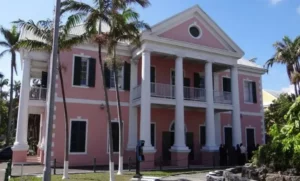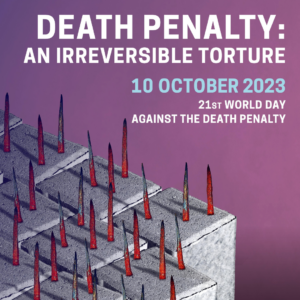
A Lawyer Writes: Man cleared after 12 years in prison Judges find voluntary confession inherently improbable
- DPP in the Media
- 2 Jun 2023
This article was originally published in ‘A Lawyer Writes‘ – legal blog by Joshua Rozenbeg, 1 June 2023.
Just occasionally, you read a judgment that makes your jaw drop.
This one was delivered yesterday by five justices of the Supreme Court. In the words of Lord Kitchin and Lord Burrows, it’s about “a young man [who] has been languishing in prison for over 12 years on the basis of a confession that should never have been admitted in evidence against him”.
Vinson Ariste was 20 when he was arrested. It seems the police wanted to question his brother about an armed robbery. Perhaps not surprisingly, the brother was not at home when the police came looking for him. So they arrested Ariste instead.
In a passage dripping with irony, Kitchin and Burrows describe what happened after Ariste had spent nearly a week in police custody:
If the record of the interview in which [he] confessed to the robbery… is to be believed, he volunteered a full account of his participation in this offence purely of his own accord without any encouragement and without being confronted with any evidence implicating him in the robbery. The [prosecutor] has not suggested any motive for this unusual act of self-sacrifice.
But a motive is not hard to find. Ariste appeared fit and well when he arrived at the police station. After he left, the prison doctor recorded that he had a number of injuries including a temporal abrasion, multiple handcuff abrasions, a skin avulsion on the left wrist, bruising of the buttocks, and a 6cm abrasion or ulcer on his right buttock.
His confession had been beaten out of him, he claimed. The police had suffocated him.
There was no video or audio recording of his statement. He had not been allowed to see a lawyer at the police station. He had no legal representation at his trial nearly two years later. The judge gave no reasons for deciding that his confession was admissible. There was no evidence linking Ariste to the robbery or to any other offence. He had no previous convictions.
But Ariste was found guilty of armed robbery and sentenced to 15 years. Some months later, three appeal judges upheld his conviction in a single paragraph:
In our view, having accepted the evidence for the witnesses for the prosecution and, after hearing the incredible story of beating, and the evidence of the doctor that the injury to the head and buttocks were two to three weeks old (which would mean that they were inflicted prior to his coming into police custody); and his evidence that the injuries could possibly have been caused by a car accident (of which there was evidence); that it was reasonable for the judge to determine in all the circumstances that the prosecution had proven beyond a reasonable doubt that the record of interview was not obtained by oppression and that there was nothing done or omitted to be done to make it unreliable.
Incredible? No, in the Bahamas.
Fortunately, Ariste’s case was taken up by the Death Penalty Project, a group of lawyers based at the London law firm Simons Muirhead Burton. For more than 30 years, the project has provided free legal representation to vulnerable prisoners, including those facing the death penalty.
They instructed Paul Bowen KC, Emma Mockford and Jagoda Klimowicz of Brick Court Chambers in London together with Krysta A Mason Smith of Murrio Ducille & Co in the Bahamas. All acted without payment.
A number of Commonwealth countries and other jurisdictions permit appeals to the Judicial Committee of the Privy Council, a court whose members are mostly justices of the UK Supreme Court. Five justices heard Ariste’s appeal at the end of March.
An appeal against conviction may be allowed in the Bahamas if the court thinks that the verdict should be set aside on the grounds that there was a wrong decision or misdirection on any question of law or fact. But that’s subject to a proviso: the court may instead dismiss the appeal if it considers that no miscarriage of justice has actually occurred.
The Privy Council found no evidence that the trial judge had taken three troubling matters into account:
- Ariste was not legally represented at the police station
- There was no record of any injuries on his arrival at the police station
- It was inherently improbable that he would voluntarily confess, without a lawyer, to at least six offences or groups of offences, including murder, for which there was no independent evidence.
If the judge had done so, it was “difficult to see how he could rationally have concluded that the prosecution had proved beyond reasonable doubt that the confession was not obtained by beating”.
The conclusion that the confession evidence should not have been admitted was sufficient for Ariste’s appeal to be allowed. The proviso did not apply because the Privy Council did not consider that no miscarriage of justice has actually occurred.
There were four more factors that rendered the conviction unsafe and unsatisfactory, another ground of appeal:
- There was a discrepancy in the doctor’s evidence that supported Ariste’s account of the beatings
- He was not legally represented at his trial
- The jury was not told he was of good character
- Another judge had refused to admit a separate confession made during the same period of detention.
In a statement issued by his lawyers, Ariste said:
I am just happy I got my life back. This has lifted a huge burden off of my shoulders and has proven what I’ve been trying to tell the world all along — that I am innocent and that I knew nothing of these matters. I am just so happy that I can move on and get my life back together. I feel uplifted. Thank God!




















